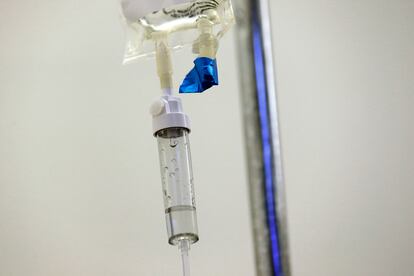Cancer centers say US chemotherapy shortage is leading to treatment complications
Experts say the shortages developed earlier this year after a factory in India paused production following an inspection that generated concerns about quality. The FDA has taken some steps to try to ease the shortage

A growing shortage of common cancer treatments is forcing doctors to switch medications and delaying some care, prominent U.S. cancer centers say.
The National Comprehensive Cancer Network said Wednesday that nearly all the centers it surveyed late last month were dealing with shortages of carboplatin and cisplatin, a pair of drugs used to treat a range of cancers. Some are no longer able to treat patients receiving carboplatin at the intended dose or schedule.
Dr. Kari Wisinski has had to turn to other treatments for some patients or switch the order in which people receive their drug combinations. She said she’s done that “hoping that within three months there will be a better carboplatin supply.”
“It’s really difficult as a physician to have these conversations with a family or a patient about not having a medication you’d like to prescribe to them,” she said.
Wisinski is a breast cancer specialist with the UW Health Carbone Cancer Center in Madison, Wisconsin, a member of the network. She said doctors, nurses and pharmacists at her center have done a good job managing the drug supply, but doing so has taken them away from other elements of care.
Of the 27 cancer centers that responded to the network’s survey, 25 reported a shortage of carboplatin. Among the cancer centers with shortages of carboplatin, more than a third said they were unable to treat all patients according to the intended dose and schedule.
Nineteen hospitals also reported cisplatin shortages, but all said they were able to maintain the treatments for existing patients.
The problem started developing earlier this year, said Mike Ganio, who studies drug shortages at the American Society of Health-System Pharmacists.
“I think it went from being a shortage to being a really bad shortage really quickly,” he said. “There’s not a whole lot of room for it to get worse.”
Ganio’s society reported the cisplatin shortage in January and then carboplatin in late March, months after a factory in India that makes both drugs paused production following an inspection that raised quality concerns.
Manufacturing problems, unexpected demand spikes and tight ingredient supplies have all contributed to a growing number of prescription drug shortages in the United States. Many patients with attention deficit/hyperactivity disorder have had a hard time filling prescriptions for Adderall this year, and drugstores ran out of children’s medicines during last winter’s cold-and-flu season.
There were 301 active national drug shortages through this year’s first quarter, according to the University of Utah Drug Information Service.
The U.S. Food and Drug Administration has taken some steps to try to ease the chemotherapy shortage. The agency is allowing the temporary importation of some foreign-approved versions of cisplatin from factories registered with the FDA.
That should help, but the big factor is getting the factory in India back up to full production, Ganio said.
He also noted that drug supply shortages are a decades-old problem.
“We really need to get at the root causes of these shortages or they’re going to continue happening,” he said.
Sign up for our weekly newsletter to get more English-language news coverage from EL PAÍS USA Edition
Tu suscripción se está usando en otro dispositivo
¿Quieres añadir otro usuario a tu suscripción?
Si continúas leyendo en este dispositivo, no se podrá leer en el otro.
FlechaTu suscripción se está usando en otro dispositivo y solo puedes acceder a EL PAÍS desde un dispositivo a la vez.
Si quieres compartir tu cuenta, cambia tu suscripción a la modalidad Premium, así podrás añadir otro usuario. Cada uno accederá con su propia cuenta de email, lo que os permitirá personalizar vuestra experiencia en EL PAÍS.
¿Tienes una suscripción de empresa? Accede aquí para contratar más cuentas.
En el caso de no saber quién está usando tu cuenta, te recomendamos cambiar tu contraseña aquí.
Si decides continuar compartiendo tu cuenta, este mensaje se mostrará en tu dispositivo y en el de la otra persona que está usando tu cuenta de forma indefinida, afectando a tu experiencia de lectura. Puedes consultar aquí los términos y condiciones de la suscripción digital.








































